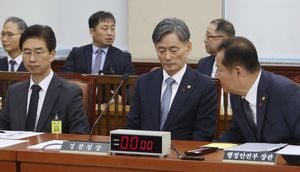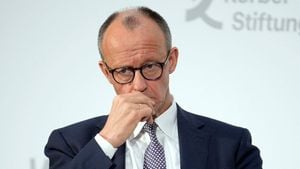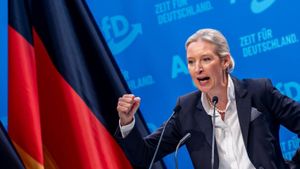The world is changing, and so is our narrative about migration. The new series "Families Like Ours," directed by Oscar-winning filmmaker Thomas Vinterberg, threads together the struggles of families contending with the perils of climate change and migration. Premiering on February 22 and 23, 2025, this seven-part drama brings viewers to the forefront of societal collapse, reexamining the refugee experience through the lens of those from wealthy nations.
At the heart of the show is Laura, played by Amaryllis August, who finds herself embroiled in turmoil as her home country, Denmark, faces severe environmental changes. The series opens with government officials discussing the dire consequences of rising sea levels and the need for evacuation: "Sie machen das Land dicht, Laura. Ganz Dänemark wird evakuiert," one character ominously reveals, underscoring the imminent threats to their homeland. This phrase hints at the stark transformation of citizens from prosperous lives to becoming refugees at the mercy of changing tides.
Throughout the episodes, viewers follow Laura’s chaotic escape from Denmark, aiming to reunite with her friend Elias (Albert Rudbeck Lindhardt) after being stranded during her perilous travels. The narrative sheds light on her treacherous maneuvering through the chaos of human smuggling—an experience fraught with risk and fear. Laura's painful decision-making is marked by uncertainties as she attempts to cross borders to reach her mother Fanny (Paprika Steen) who resides in Bucharest, Romania.
Vinterberg, along with co-writer Bo Hr. Hansen, intricately crafts this story, erasing the traditionally linear narratives tied to migration. Instead, it evokes empathy by compelling the audience to recognize the shared humanity between all people amid crisis. When Laura waits for Elias at the arranged meetup point, only for him to not appear, the show's emotional weight deepens as she reflects on the real peril of losing loved ones, stating her concern, "Vergeblich habe ich gewartet, er gilt seit seinem illegalen Grenzübertritt nach Polen als vermisst." This encapsulates her desperation, portraying the grave realities of displacement.
The series resonates with current events, where the notion of privilege transforms. While Denmark has often been viewed as a safe haven, the tables turn as Norwegians and Germans are forced to reassess their borders and the impact of their immigration policies. The theme of familial bonds as refuge amplifies as Laura's mother, Fanny, struggles with the bureaucratic challenges of securing visas reflecting the broader societal struggle where financial stability often shapes the fate of would-be refugees. "Man bekäme es nur mit sehr hohem Mindesteinkommen plus Beschäftigungsverhältnis," states a migration official, depicting the cold realities many face.
Notably, the story arc illuminates not just the political undercurrents but personal ones as well, as Laura’s patchwork family fosters resilience against adversity. Unlike Vinterberg’s earlier works, where familial ties were fraught with dysfunction and strife, "Families Like Ours" paints family bonds as sources of strength and support. Whether through daily struggles or traversing dangerous routes across Europe, characters are portrayed as steadfast, determined to uphold each other’s wellbeing against societal pressures.
The series does not shy away from depicting the magnitude of loss, uncertainty, and the bitter taste of survival. It reminds viewers of the strengths derived from love during tumultuous changes. Laura’s decision to forego her place at university, choosing instead to stand by her mother speaks volumes about courage and loyalty: "Mama, ich komme mit dir nach Rumänien," encompassing the series' core values of solidarity and human connection.
Vinterberg brings to life the human experience amid political machinations, giving face to the abstract concept of migration, often depicted through the lens of statistics or distant narratives. By shifting focus onto Laura and her family fighting against the odds, "Families Like Ours" becomes not only compelling entertainment but also on-point social commentary reflecting the contemporary socio-political climate.
Ending on hopeful notes promotes reflection. The struggle faced by Laura and Fanny is not just theirs, but shared by many within the shifting sands of climate-induced displacement. Vinterberg’s latest development stands out as not only entertaining but also remarkably relevant. It compels the audience to reflect on their roles within these narratives and engage with the broader discussions surrounding migration, climate justice, and community resilience.



